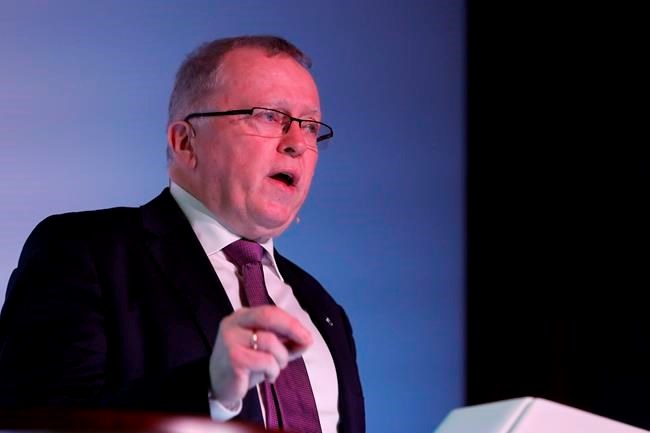ST. JOHN'S, N.L. — The premier of Newfoundland and Labrador played it cool Wednesday as Norwegian energy giant Equinor announced it was suspending plans to develop a $16-billion oil project in the province's offshore.
Andrew Furey said the news that Equinor would postpone the Bay du Nord project for up to three years came as a surprise. But he said he remains confident the oilfield would still be developed.
"Of course we're disappointed in the delay, but I would caution everybody that it's just that: it's a delay," he told reporters, adding that Equinor has not given any indication it was interested in walking away from the development.
"The resource is still there. It's not going anywhere," Furey said.
Bay du Nord comprises five different discovery areas off the province's east coast that are said to hold a total of 979 million barrels of recoverable oil, according to recent estimates from Newfoundland and Labrador's offshore oil regulator. The development would open the province's fifth offshore oilfield and be its first deepwater oil project.
Newfoundland and Labrador’s latest budget factored in economic gains from the Bay du Nord project beginning in 2025.
Equinor announced its "strategic postponement" of the project in a news release Wednesday as the province's annual energy industry conference was taking place in downtown St. John's, N.L. It said Bay du Nord had seen significant cost increases in recent months, mostly due to volatile market conditions.
Though the company had not yet confirmed it would make the full investment necessary to carry the project through to completion, there was early-phase work underway, including concept studies and assessments, spokesperson Alex Collins said in an email. She said the company will use the delay to "optimize" the project and work toward a "successful development."
Equinor reported a net profit of $28.7 billion in 2022, up from $8.6 billion a year earlier.
The postponement is the second bout of bad news for Newfoundland and Labrador's offshore industry this year. The Terra Nova oilfield, which is majority owned by Suncor Energy, is also delayed. The field hasn't produced oil since 2019, and during the height of the COVID-19 pandemic it seemed Suncor and its partners would abandon it entirely.
The provincial government ultimately gave Suncor $205 million to guarantee the company would carry on with work to extend the life of the field by about 10 years. The province also made adjustments to its royalty scheme to give Terra Nova owners another $300 million over that decade.
Suncor had hoped the field would be back in operation at some point this summer, but it has since removed any production or income forecasts from the project from its financial outlooks for the year.
Furey said any worry now about the two oil projects is "nowhere near" the anxiety that gripped his government during the pandemic when it seemed that Suncor would walk away from Terra Nova. "That is not the environment we're in right now," he said.
The federal government gave Bay du Nord environmental approval last April, drawing sharp criticism from environmentalists. Equinor and the Newfoundland and Labrador government have said the project will produce far fewer greenhouse gas emissions during extraction than any other project in Canada. But environmentalists and climate scientists counter that the bulk of the greenhouse gas emissions from fossil fuels are produced when they are burned.
On Wednesday, Sierra Club Canada said the latest news shows Newfoundland and Labrador must wean itself off revenues from offshore oil. "We know that expanding oil and gas extraction ... is unacceptable and that climate change will only be worse in three years time," spokesperson Connor Curtis said in a news release.
This report from The Canadian Press was first published on May 31, 2023.
Sarah Smellie, The Canadian Press




